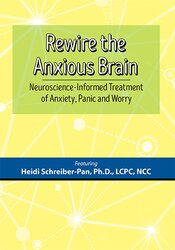
×

Join Dr. Heidi Schreiber-Pan and learn her keys for successful anxiety treatment. Dr. Schreiber-Pan integrates brain-based strategies for calming the anxious mind with client communication techniques that motivate change in your clients. Heidi’s approach promotes adherence to treatment and strengthens the therapeutic alliance – which is essential when working with anxious, worried, traumatized, or obsessive clients. Dr. Schreiber-Pan will give you tools and techniques to:
Register today for this workshop and put the power of neuroplasticity to work for you and your anxious clients!
All members of the PESI, Inc. planning committee have provided disclosures of financial relationships with ineligible organizations and any relevant non-financial relationships prior to planning content for this activity. None of the committee members had relevant financial relationships with ineligible companies or other potentially biasing relationships to disclose to learners. For speaker disclosures, please see the faculty biography.
NOTE: Each purchase includes CE credit for one individual (participants in full attendance will be able to print the certificate of completion after passing the online post-test (80% passing score) and completing the evaluation). Instructional methods will include PowerPoint, didactic lecture, Q&A, and others.
Continuing Education Information: Credits listed below are for full attendance at the live, interactive webinar only. This webinar is being broadcast live in real-time and must be attended live, in its entirety, in order to earn credit. You will be able to type questions to the speaker. The speaker will see the questions and address them during the presentation as time allows. Please note, your licensing board dictates whether web-based activities are an acceptable form of continuing education, as well as which credit types are acceptable for continuing education hours. Please refer to your licensing board's rules and regulations. If your profession is not listed, please contact your licensing board to determine your continuing education requirements and check for reciprocal approval. For other credit inquiries not specified below, please contact info@pesi.com or 800-844-8260 before the event.
Materials that are included in this course may include interventions and modalities that are beyond the authorized practice of your profession. As a licensed professional, you are responsible for reviewing the scope of practice, including activities that are defined in law as beyond the boundaries of practice in accordance with and in compliance with your profession's standards.
For Planning Committee disclosures, please see the statement above. For speaker disclosures, please see the faculty biography.
Earn up to 6.25 CE hours. Please see below, for more details, as credit amounts vary by jurisdiction and profession.

PESI, Inc., #1062, is approved as an ACE provider to offer social work continuing education by the Association of Social Work Boards (ASWB) Approved Continuing Education (ACE) program. Regulatory boards are the final authority on courses accepted for continuing education credit. ACE provider approval period: January 27, 2023 - January 27, 2026. Social workers completing this course receive 6.25 Clinical continuing education credits.
Course Level: Intermediate Format: Synchronous distance. Full attendance is required; no partial credits will be offered for partial attendance.
Canadian Social Workers: Canadian provinces may accept activities approved by the ASWB for ongoing professional development.
PESI, Inc. is approved by the Canadian Psychological Association to offer continuing education for psychologists. PESI, Inc. maintains responsibility for the program. This program is approved for 6.0 continuing education hours. Full credit statement at: www.pesi.com/cpa-statement
This activity qualifies for 380 continuing education minutes as required by many national and local licensing boards and professional organizations. Save your activity advertisement and certificate of completion, and contact your own board or organization for specific requirements.
This live remote program is approved by the National Association of Social Workers (Approval #886759332-1642) for 6.0 continuing education contact hours in Clinical Social Work.

This course has been approved by PESI, Inc., as a NAADAC Approved Education Provider, for educational credits. NAADAC Provider #77553. PESI, Inc. is responsible for all aspects of their programming.
This course offers 6.0 continuing education contact hours in the Counseling Services skill group. Full attendance is required; no partial credit will be awarded for partial attendance.

PESI, Inc. is accredited as a provider of nursing continuing professional development by the American Nurses Credentialing Center’s Commission on Accreditation. Nurses in full attendance will earn 6.25 contact hours. Partial contact hours will be awarded for partial attendance.

Heidi Schreiber-Pan, PhD, LCPC, NCC, is a successful psychotherapist, author, clinical director and sought-after nationwide speaker on topics of resilience, anxiety, neuroscience, and occupational burnout. As an affiliate and former faculty member of Loyola University, Maryland, her past research has focused on resiliency and psychological well-being, including nature-based mental health.
Dr. Schreiber-Pan has worked with various organizations, schools and corporations to reduce stress on a communal level and to increase structural well-being through training in positive psychology as well as emotional intelligence coaching.
She has developed unique continuing education courses that combine established clinical methods such as CBT with innovative treatment approached including nature-based psychotherapy and neuro-counseling. She is the author of Taming the Anxious Mind: A Guidebook to Relieve Stress and Anxiety.
Speaker Disclosures:
|
Rewire the Anxious Brain: Neuroscience-Informed Treatment of Anxiety, Panic and Worry
Mon, Mar 03, 2025 - 08:00am to 04:00pm EST - Product Code LWC053420 |
For live CE credit, you must watch the live webcast in its entirety at its scheduled time and complete the CE quiz and evaluation within one week. You will have access for 90 days after the program for review.
Please note: There will be a 70-minute lunch and two 15-minute breaks; one in the morning and one in the afternoon. Lunch and break times will be announced by the speaker and at their discretion. A more detailed schedule is available upon request.
Visit our FAQ page at https://www.pesicanada.ca/faq or contact us at https://www.pesicanada.ca/contact-us.
Research, Risks and Limitations
| 5 |
|
| 4 |
|
| 3 |
|
| 2 |
|
| 1 |
|
Satisfaction Guarantee
Your satisfaction is our goal and our guarantee. Concerns should be addressed to info@pesicanada.com.
Please wait ...